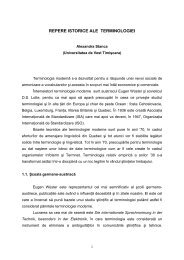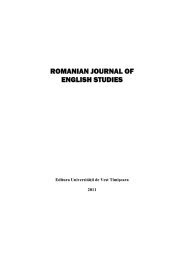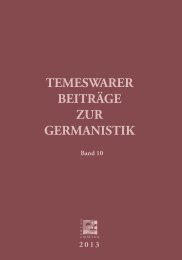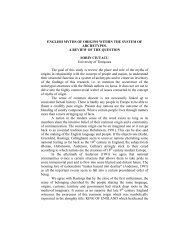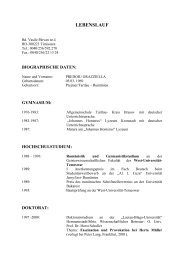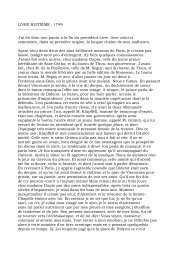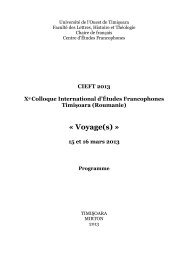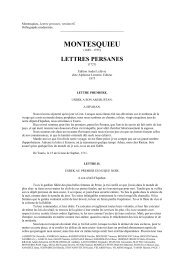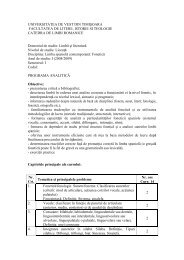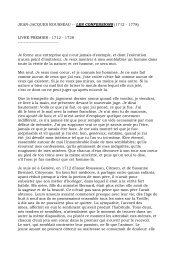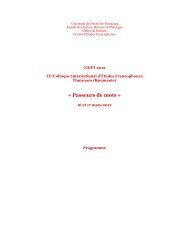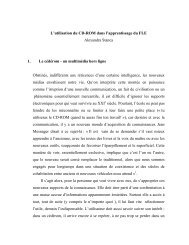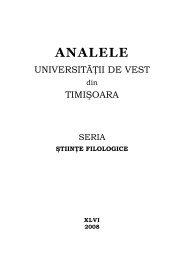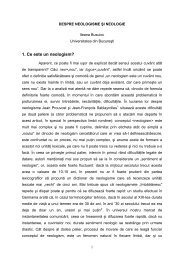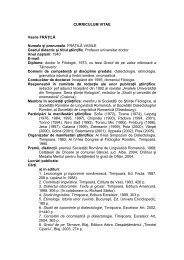TRANSLATION AND MEANING: A CULTURAL- COGNITIVE ...
TRANSLATION AND MEANING: A CULTURAL- COGNITIVE ...
TRANSLATION AND MEANING: A CULTURAL- COGNITIVE ...
Create successful ePaper yourself
Turn your PDF publications into a flip-book with our unique Google optimized e-Paper software.
2.2.5 Infinitive Phrases<br />
The words obtained from syntactic structures the center of which is<br />
to-infinitive, and which are most often in the passive voice form, can have<br />
the negative particle not as their first element, or any of the adverbial<br />
modifiers, of the type soon, much, never, etc.<br />
[[[Adv] [InfPPass.]]InfP] Nm<br />
Such examples are formed with the past participle of the lexical verb<br />
as presented here: not-to-be-missed film, much-to-be-admired director,<br />
never-to-be-forgotten meeting, soon-to-be-discovered truth, well-to-do<br />
classes or other similar contextualized uses which served as examples in<br />
OED: ever-to-be-lamented parent. Also, certain less used examples were<br />
registered in our research corpus, one of the most representative of which<br />
would be ...soon-to-be-dead Sawyer. (SKPS,716).<br />
2.2.6 Participial Phrases<br />
Phrasal fragments and sometimes full-fledged participial phrases can<br />
take part in the formation of APCs, first of all judging by the fact that the<br />
central element is a present participle. The basic constitution of this<br />
structural model could be represented as follows:<br />
[[[V-ing] [InfP]]PartP] Nm<br />
The non-head elements of the original phrase are infinitival<br />
complements or adverbial modifiers, which can be noticed in the two<br />
instances supplied here: beginning-to-dream stage, learning-to-drive.<br />
Aside from these, it is possible to have adverbial lexical strings<br />
formed of three or four elements, the most important member of which is<br />
the past participle form conjoined to coordinated nouns, adjectives or noun<br />
phrases: red-and-white-striped jersey, wood-and-barrel-littered floor.<br />
2.2.7 Adverb Endocentric Phrases<br />
The most obvious formative pattern of adverbial phrase<br />
lexicalization in English is the one which involves infinitives combined with<br />
adverbs, predominantly well- or ill-.<br />
[[[Adv] [InfP]] AdvP] Nm<br />
There are not many words of this type: well-to-do family, ill-to-do<br />
parents, etc. In all other cases, it is usually a matter of combining adverbs of<br />
various kinds with coordinators such as and or or, as in the sentence taken<br />
from the OED: A once-and-for-all deduction from pension. Other patterns<br />
and illustrative examples involve: [[[Adv] [PP]] AdvP] Nm<br />
down-to-earth wishes, up-to-date dress.<br />
[[Adv1] [COORDINATION] [Adv2]AdvP] Nm



